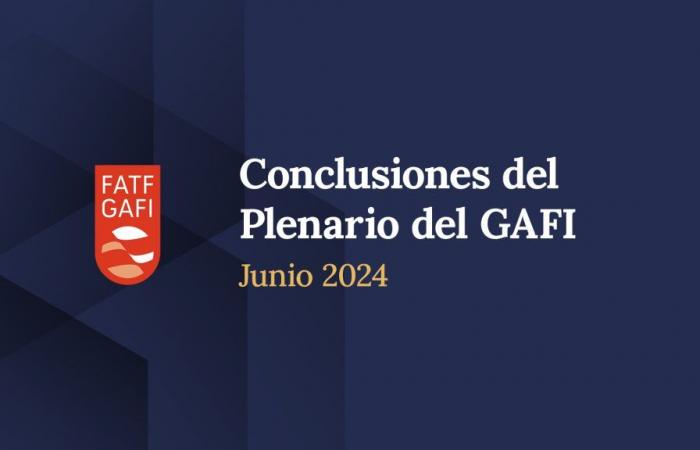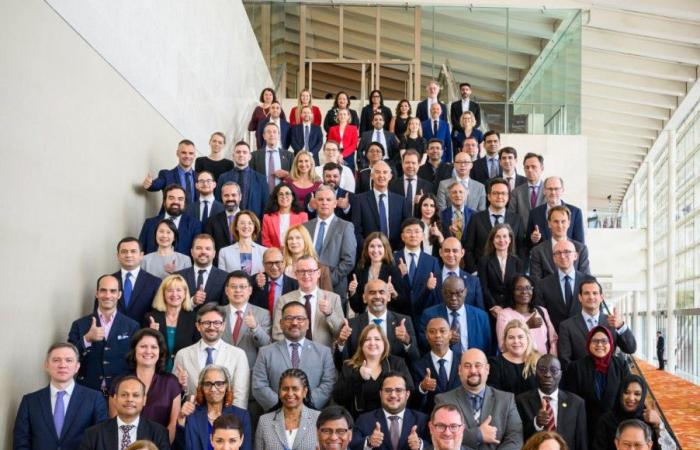Delegates from more than 200 jurisdictions that are members of the global network as well as international organizations as observers participated in the meetings of the different Working Groups and the FATF Plenary on key aspects of ML /FT/FP.
In addition to the president and the director of International Coordination of the FIU, the Argentine delegation included Dr. Mariano Borinsky, head of the Criminal Cassation Chamber; Eugenio Curia, head of International Affairs of the Ministry of Justice; Silvina Rivarola, from the Central Bank and Felipe Giménez Losano, from the Foreign Ministry.
During the plenary, and in line with the risk-based approach (RBA), a key strategic milestone was reached by adjusting the criteria to prioritize countries under the International Cooperation Review Group (ICRG) process, i.e. the so-called gray or black list inclusion processes. These changes will be applied in the next round of assessments, which will begin shortly, and will make the process even more embracing of the EBR by adding greater awareness to the capacity challenges faced by least developed countries.
In preparation for the next round of mutual evaluations, delegations agreed how countries will be assessed for compliance with the newly revised FATF Standards that further enhance asset recovery, cooperation framework international law and mechanisms to more effectively deprive criminals of the use of assets derived from illicit activities.
In addition, the second Learning and Development Forum was organized, focusing on supporting the implementation of the revised standards that refer to final beneficiaries.
The delegations together with the FATF Secretariat discussed and adopted the Mutual Evaluation of India and Kuwait.
The FATF reiterated its concern about the continued failure of the Democratic People’s Republic of Korea to address significant deficiencies in its anti-money laundering and countering the financing of terrorism regime and the serious threats posed by illicit activities related to the proliferation of weapons of mass destruction and their financing.
Members thanked the Singapore Presidency for promoting the “Women in the FATF and Global Network (WFGN)” initiative. Highlights of this initiative include the multicultural mentoring pilot program involving 15 mentor-mentee pairs from diverse cultures and backgrounds and the launch of the book in digital format: “Breaking Barriers: Inspiring the Next Generation of Women Leaders” , featuring stories from distinguished leaders from the FATF and Global Network.
Among the agreed strategic initiatives are:
Horizontal review of technical compliance of DNFBPs related to corruption
The FATF completed its review of the measures its members have implemented to prevent accountants, lawyers, real estate agents and trust and corporate service providers from being used to facilitate money laundering. assets and the financing of terrorism. The FATF will publish the results of this review in July 2024.
Virtual assets: specific update on the implementation of FATF standards
It was agreed to publish next July the fifth annual update on the progress of jurisdictions in the implementation of the FATF Standards on virtual assets and virtual asset service providers. The number of jurisdictions that comply or mostly comply with the FATF Standards in this area has increased from 25 in 2023, to 33 in 2024. However, 75% of jurisdictions They only partially comply or do not comply with the FATF Standards on PSAV, which determines the vulnerability of the sector. 
Transparency in cross-border payment systems
The FATF together with member jurisdictions is in the process of revising one of its Standards to reflect the evolution of cross-border payment systems and changes in standards in the regarding R16 (in particular regarding the new requirements of the ISO20022 standards for that sector). In the Plenary, the results of the public consultation with the private sector on the aforementioned draft amendments were discussed, which closed on May 3, 2024. This R16 revision aims to help make cross-border payments faster, cheaper, more transparent and inclusive, while ensuring AML/CFT compliance. In Plenary it was agreed that, given the complexity of the requirements and the potential impact on payment systems, further dialogue should be carried out with relevant bodies and experts from both the public and private sectors before finalize the modifications.
International cooperation
Three priorities of the Global Network were agreed for the coming year:
- Increase the voice and participation of regional groups in the work of the FATF
- Preparing for the new round of mutual evaluations
- Strengthening AML/CFT experience at the regional level
Priorities of the incoming Mexican presidency for 2024-2026
Mexico assumes the presidency of the FATF from July 1, 2024 to June 30, 2026. The incoming president, Elisa de Anda Madrazo, presented her plan of priorities for her management at the head of the international group.
These priorities include an increased focus on financial inclusion; ensuring a successful start to the Fifth Round of Mutual Evaluations; strengthening the cohesion of the Global Network; supporting the effective implementation of the revised FATF Standards with a particular focus on asset recovery, transparency and beneficial ownership, and virtual assets and virtual asset service providers; and continued efforts to combat terrorist financing and the proliferation of weapons of mass destruction.
Access to the official FATF statement in English: here







